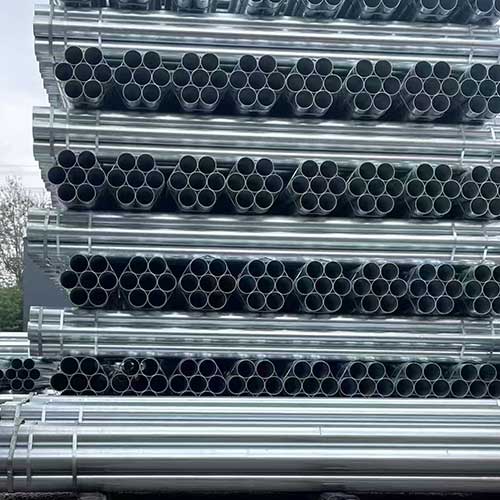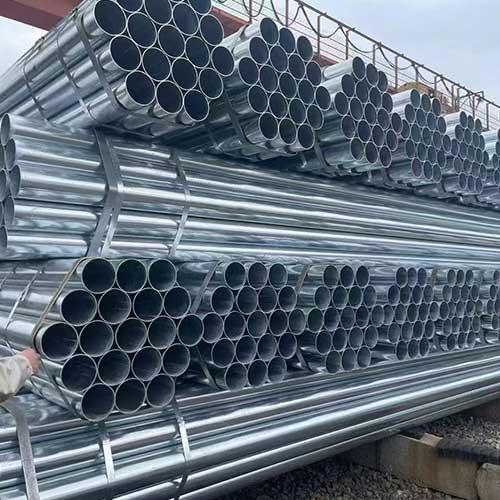Welcome to My Blog!
Before we dive into the content, I’d love for you to join me on my social media platforms where I share more insights, engage with the community, and post updates. Here’s how you can connect with me:
Facebook:https://www.facebook.com/profile.php?id=61565500692293
Now, let’s get started on our journey together. I hope you find the content here insightful, engaging, and valuable.
Table of Contents
Introduction
Steel galvanized pipe is a type of pipe that is made from carbon steel and coated with a layer of zinc through a process called galvanization. The zinc coating acts as a barrier, protecting the steel from corrosion and extending its lifespan. Steel galvanized pipes have been widely used in various plumbing systems for decades due to their robustness and reliability.
What is Galvanization?

Galvanization is a process in which a thin layer of zinc is applied to the surface of steel pipes to prevent rust and corrosion. The zinc layer serves as a protective barrier that shields the steel from environmental elements like moisture, chemicals, and other corrosive substances, significantly enhancing the material’s durability and lifespan.
Benefits of Using Steel Galvanized Pipe in Plumbing
Steel galvanized pipe offers numerous benefits, which make it an ideal choice for plumbing systems in various settings, including residential, commercial, and industrial applications.
Durability and Longevity
One of the primary reasons why many choose steel galvanized pipes for plumbing is their durability. The zinc coating helps to protect the pipe from rust, corrosion, and other forms of wear and tear, making it ideal for long-term use. Steel galvanized pipes can last for several decades, often outlasting other materials such as PVC or copper.
Corrosion Resistance
The zinc coating on steel galvanized pipes provides an additional layer of protection against corrosion. Over time, the zinc sacrificially corrodes instead of the steel pipe, which helps to keep the inner steel layer intact. This corrosion resistance makes steel galvanized pipes suitable for both indoor and outdoor plumbing applications, even in areas with high moisture levels.
Strength and Load-Bearing Capacity
Steel galvanized pipes are known for their strength and load-bearing capacity. These pipes are able to withstand high-pressure systems and heavy workloads without deformation or rupture. This makes them suitable for plumbing systems in commercial buildings, factories, and high-pressure water systems.
Versatility and Adaptability
Steel galvanized pipes are highly versatile and can be used for a variety of plumbing applications. Whether you’re installing a water supply system, irrigation system, or gas line, steel galvanized pipes can handle diverse plumbing tasks. Their adaptability makes them a top choice for many industries, including construction, agriculture, and manufacturing.
Cost-Effective Solution
While steel galvanized pipes may have a higher initial cost compared to some other plumbing materials, their long lifespan and resistance to corrosion make them a cost-effective choice in the long run. Fewer replacements and less maintenance required lead to lower overall costs, making them a wise investment for both homeowners and businesses.
Applications of Steel Galvanized Pipe
Steel galvanized pipes are used in a wide range of plumbing applications, from residential plumbing systems to industrial-grade installations. Below are some of the most common uses of steel galvanized pipes.
Residential Plumbing Systems
In residential plumbing, steel galvanized pipes are often used for water supply lines, drainage systems, and gas lines. Their durability and corrosion resistance make them well-suited for indoor and outdoor plumbing applications. While modern plumbing often uses alternatives like PVC or PEX, galvanized steel pipes are still common in older homes.
Commercial and Industrial Plumbing
Steel galvanized pipes are commonly used in commercial and industrial plumbing applications where high-strength, high-pressure systems are required. They are ideal for use in factories, warehouses, and large buildings that require reliable water supply and drainage systems. The strength and load-bearing capacity of steel galvanized pipes make them ideal for handling the demanding needs of commercial and industrial plumbing systems.
Irrigation Systems
Galvanized steel pipes are also commonly used in irrigation systems for agriculture and landscaping. Their ability to withstand high-pressure water flow and resist corrosion in outdoor environments makes them a great choice for farmers, landscapers, and gardeners.
Gas Supply Lines
In addition to water and drainage systems, steel galvanized pipes are also used for gas lines. The strength of the pipes allows them to safely carry natural gas or propane over long distances without risk of rupture or damage.
Comparing Steel Galvanized Pipe with Other Plumbing Materials
| Property | Steel Galvanized Pipe | Copper Pipe | PVC Pipe | PEX Pipe |
|---|---|---|---|---|
| Durability | Very High | High | Moderate | Moderate |
| Corrosion Resistance | Excellent | High | None | None |
| Strength | High | Moderate | Low | Low |
| Load-Bearing Capacity | High | Low | Low | Low |
| Ease of Installation | Moderate | Moderate | Easy | Very Easy |
| Cost | Moderate | High | Low | Low |
| Lifespan | 40+ Years | 50+ Years | 25-40 Years | 20-50 Years |
| Applications | Water, Gas, Irrigation | Water, Gas | Water, Drainage | Water, Heating |
Considerations When Choosing Steel Galvanized Pipe

While steel galvanized pipes are an excellent choice for many plumbing systems, there are some considerations to keep in mind when choosing them for your next project.
Installation Challenges
Installing steel galvanized pipes can be more difficult than some other materials, particularly PVC or PEX. The pipes are heavier and may require special tools for cutting and fitting. Additionally, galvanized steel pipes require threading and fittings, which may require a higher level of skill to install properly.
Susceptibility to Mineral Buildup
Over time, mineral deposits can accumulate inside galvanized steel pipes, reducing water flow and efficiency. Regular maintenance and occasional cleaning can help prevent this issue, but it is something to consider when choosing this material for your plumbing system.
Not Suitable for Drinking Water in Some Areas
In some areas, older galvanized steel pipes may not be suitable for drinking water due to the potential for lead contamination. It’s important to check local regulations and ensure that your galvanized pipes are safe for use with drinking water.
Conclusion
Steel galvanized pipe is a strong, durable, and cost-effective material that is well-suited for a variety of plumbing applications. Whether you are building a residential system, a commercial installation, or an irrigation setup, galvanized steel pipes offer the strength, corrosion resistance, and longevity required for long-lasting performance. While there are some considerations, such as installation complexity and mineral buildup, the benefits of using galvanized steel pipes far outweigh these challenges. Their ability to withstand harsh conditions and their versatility make them an excellent choice for plumbing needs in a variety of environments.
FAQ
How long do steel galvanized pipes last?
Steel galvanized pipes can last for up to 40 years or more, depending on the conditions they are exposed to and the quality of the galvanization process. They are designed to resist corrosion and wear for long periods, making them a reliable choice for plumbing systems.
Can galvanized steel pipes be used for drinking water?
While galvanized steel pipes can be used for drinking water, older pipes may contain lead, which can be hazardous. It is essential to check the condition of the pipes and ensure that they comply with safety standards if you are using them for potable water.
How do you maintain galvanized steel pipes?
Regular maintenance of galvanized steel pipes involves checking for signs of corrosion or mineral buildup inside the pipes. You may need to clean the pipes periodically or replace sections that have been damaged or weakened over time. Professional inspections are recommended to ensure the pipes are functioning properly.
Is galvanized steel pipe better than copper?
Galvanized steel pipe is more durable and cost-effective compared to copper, but it may be more challenging to install. Copper has a longer lifespan and is resistant to corrosion but tends to be more expensive. The choice between galvanized steel and copper will depend on your budget, installation preferences, and the specific needs of your plumbing system.
Can galvanized steel pipes be used outdoors?
Yes, galvanized steel pipes are well-suited for outdoor use. Their corrosion-resistant zinc coating makes them ideal for outdoor applications such as irrigation systems or underground water lines. However, over time, the zinc coating can wear off, so periodic inspections are necessary to ensure the pipes remain effective.

